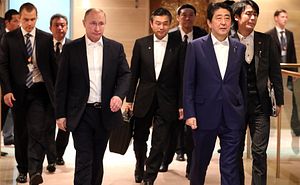Russian President Vladimir Putin made an official two-day visit to Japan in mid December, meeting with Japanese Prime Minister Shinzo Abe in the latter’s hometown of Nagato, Yamaguchi Prefecture, and at the prime minister’s office in Tokyo. This visit was initially scheduled for 2014 but had been postponed in the wake of the Ukraine crisis. It was the 16th summit meeting between Abe and Putin, counting those held during Abe’s first tenure as prime minister. The two leaders have met four times this year alone. As has become usual practice, and suggesting a strong personal bond, they met in private, spending 95 minutes with only their interpreters present.
Abe and Putin agreed to start talks over joint economic activities on the four disputed islands north of Hokkaido (part of a group known to Russia as the Kuril Islands, and known in Japan as the Northern Territories) under a “special framework” that would allow former Japanese residents of the islands to visit without restrictions. In addition, the two leaders confirmed that the eight-point economic cooperation plan that had been suggested by Japan will be put in motion, and signed a total of 68 agreements covering economic projects to be run by private enterprise and other entities. Other agreements signed included an intergovernmental memorandum on holding a Year of Japan in Russia and a Year of Russia in Japan.
Putin’s latest visit to Japan has raised hopes in some quarters that the territorial dispute will be resolved. Skeptics, however, point to a lack of any tangible progress. This can be attributed to the fact that Abe and Putin shifted from the traditional dispute, including the historical context and legal interpretation, to a forward-looking style of negotiations in which they hope to find a solution by envisioning the future of the four islands. This is a departure from the approaches of the past 70 years, during which the two nations signally failed to reach an agreement over the attribution issue and the territorial talks made no progress at all. Following the talks, Abe said that meeting had produced in-depth discussions about the territorial issue and the conclusion of a peace treaty, although the full details of the talks have yet to be made public.
A joint press statement released after the talks said that “the two leaders expressed their sincere determination to solve the issue over a peace treaty,” confirming once again that the absence of a peace treaty between Russia and Japan is abnormal. During a joint press conference, Putin clearly stated that the most important step was to conclude a peace treaty and Russia would not put that on the back burner, rebutting allegations that Russia was focusing only on economic cooperation. Putin also expressed his intention to base the negotiations on the 1956 Japan-Soviet Joint Declaration, which clearly states that the Habomai group of islets and Shikotan Island, the smaller two of the four islands in dispute, would be handed over to Japan once a peace treaty is concluded. For the two countries to successfully undertake their joint economic activities while retaining their respective standpoints on the territorial issue will be a tough ask, but it would be a significant step toward the conclusion of a peace treaty.
Meanwhile, Russia has issued strong calls for advancing the security talks that had stalled with the Ukraine crisis, including the resumption of the Japan-Russia Foreign and Defense Ministers Meeting (“2+2”). The Foreign Policy Concept of the Russian Federation, which Putin adopted on November 30, includes building good-neighborly relations with Japan to ensure stability and security in Asia-Pacific. Thus, Russia has strengthened its emphasis on relations with Japan, not only in terms of the economy but also in the security realm. During their most recent meeting, the two leaders confirmed the significance of bilateral security talks and agreed to continue a dialogue in response to the increasingly challenging security environment in the Asia-Pacific. Abe and Putin share the view that strategic cooperation between Russia and Japan is important for stabilizing the East Asian security environment. And they agree that resolving the territorial issue and concluding a peace treaty are both essential for cooperation.
Abe and Putin hope to conclude a peace treaty during their respective tenures. Putin is all but certain to be reelected in the Russian presidential election slated for 2018, while Abe is expected to remain in power until 2021 with an extension to the term limit for presidents of the Liberal Democratic Party. Given apparently stable governments in both countries, the political environment appears conducive to concluding a peace treaty. And looking back from some future time, it seems likely that Putin’s latest visit to Japan will be viewed as another step taken toward the conclusion of a peace treaty.
Shinji Hyodo is Director of the Regional Studies Department at The National Institute for Defense Studies.

































